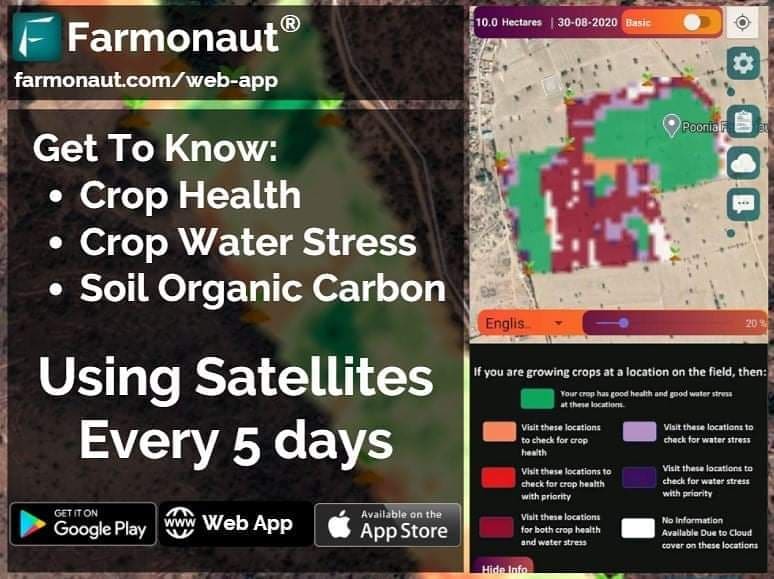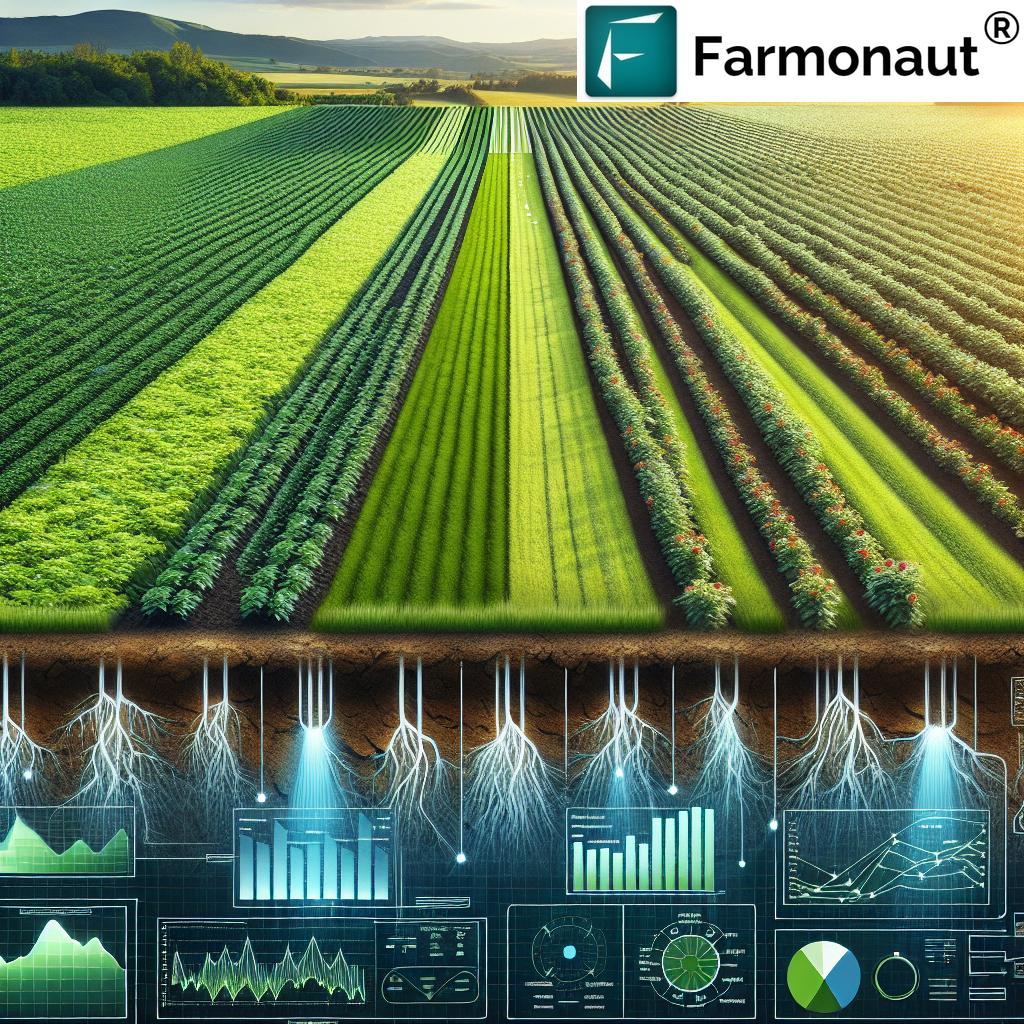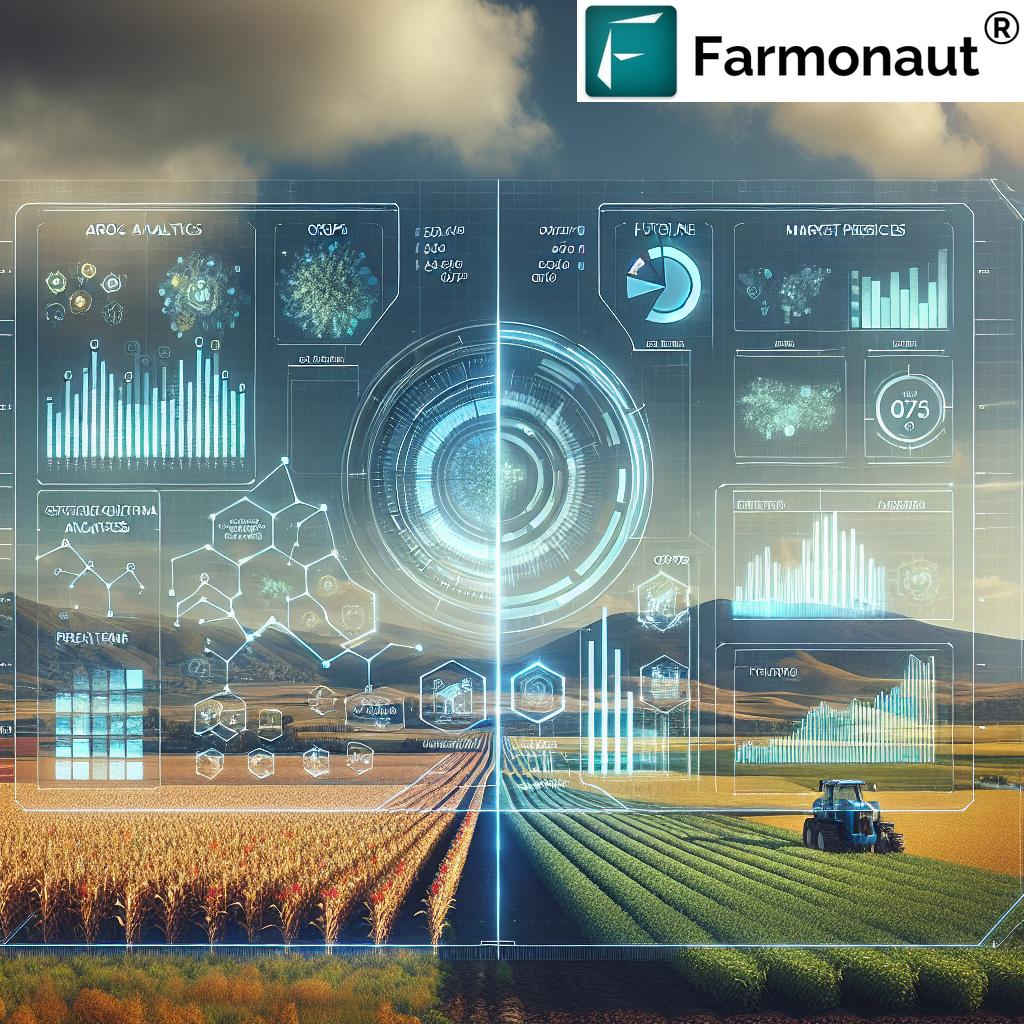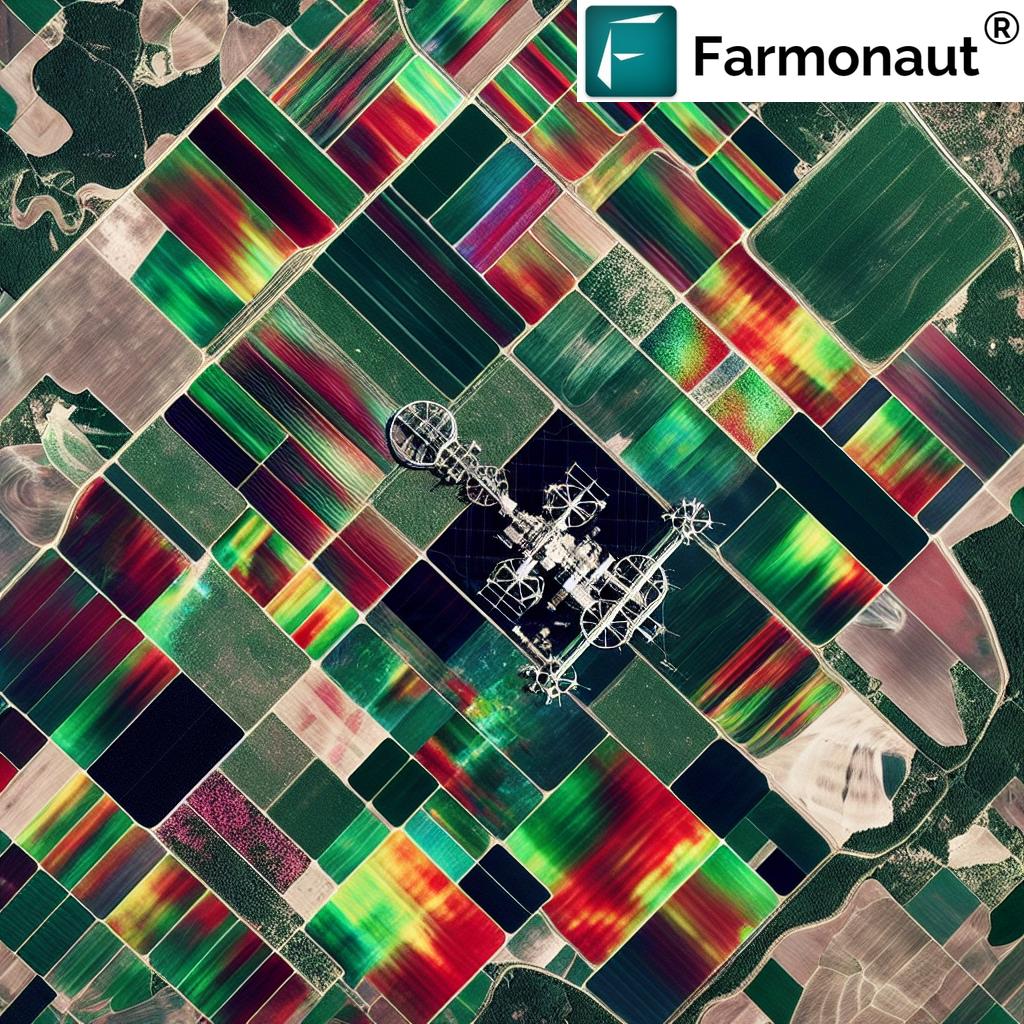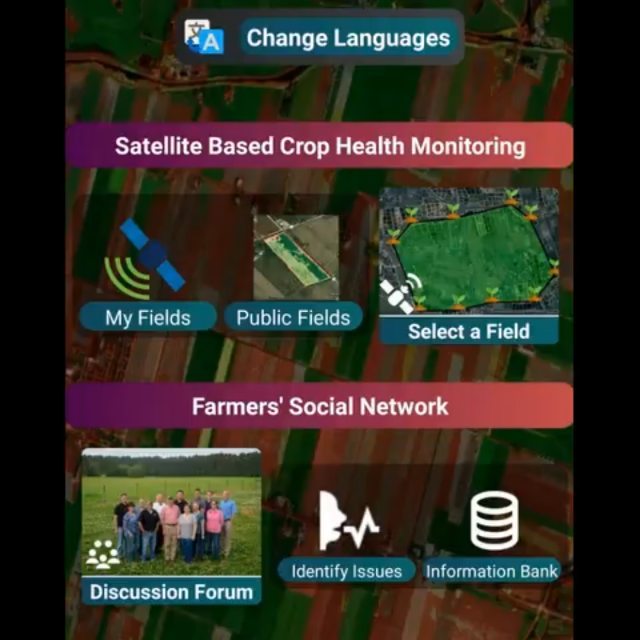Organic Pest Control for Mediterranean Fruits: From Citrus to Stone Fruits
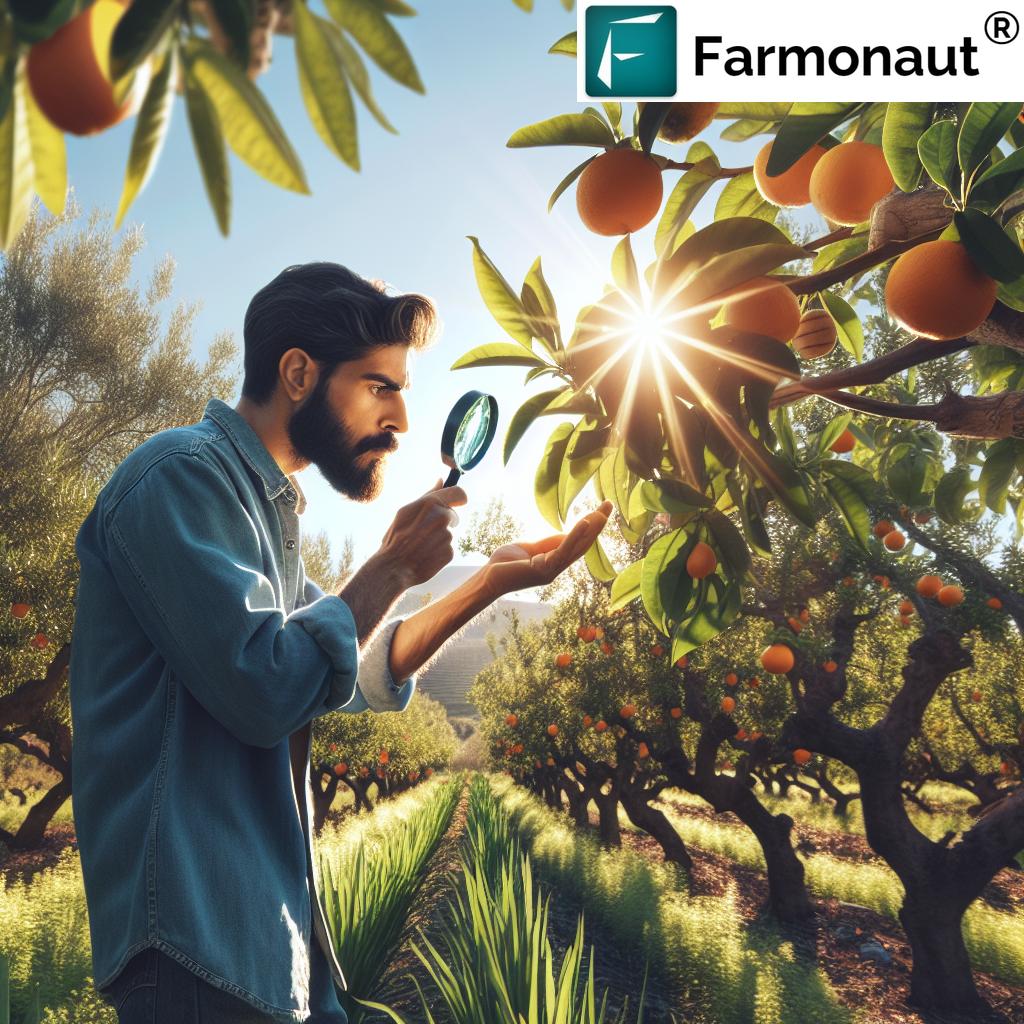
In the sun-drenched orchards of the Mediterranean, a diverse array of fruits thrives under the warm climate. From the zesty citrus groves to the lush stone fruit orchards, this region is a paradise for fruit lovers and farmers alike. However, with such abundance comes the challenge of pest control. At Farmonaut, we understand the importance of maintaining healthy fruit trees while respecting the environment. In this comprehensive guide, we’ll explore organic pest control methods for Mediterranean fruits, comparing them with conventional approaches, and showcasing how our satellite-based technology can revolutionize fruit pest management.
The Mediterranean Fruit Basket: A Diverse Ecosystem
The Mediterranean region is renowned for its rich variety of fruits, each with its unique flavor profile and cultivation requirements. Let’s take a closer look at some of the key fruits grown in this area:
- Citrus Fruits: Mandarin, orange, grapefruit, and lemon
- Stone Fruits: Peach, nectarine, apricot, plum, and cherry
- Other Fruits: Apple, pear, grapes, and fig
Each of these fruits faces its own set of pest challenges, requiring tailored approaches to pest control. At Farmonaut, we believe in leveraging technology to provide precise, fruit-specific pest management solutions.
Common Pests in Mediterranean Fruit Orchards
Before diving into control methods, it’s crucial to understand the common pests that plague Mediterranean fruit trees. These pests can be broadly categorized into insects, diseases, and other organisms:
1. Insect Pests
- Mediterranean fruit fly (Ceratitis capitata)
- Citrus leafminer (Phyllocnistis citrella)
- Olive fruit fly (Bactrocera oleae)
- Peach twig borer (Anarsia lineatella)
- Codling moth (Cydia pomonella)
2. Diseases
- Citrus greening (Huanglongbing)
- Brown rot (Monilinia fructicola)
- Peach leaf curl (Taphrina deformans)
- Fire blight (Erwinia amylovora)
3. Other Pests
- Birds
- Rodents
- Nematodes
Identifying these pests early is key to effective management. This is where Farmonaut’s satellite monitoring technology comes into play, offering real-time insights into orchard health and potential pest infestations.
Organic vs. Conventional Pest Control: A Comparative Analysis
When it comes to protecting Mediterranean fruits from pests, growers have two main approaches: organic and conventional. Let’s compare these methods and see how Farmonaut’s technology can enhance both strategies:
| Aspect | Organic Pest Control | Conventional Pest Control | Farmonaut’s Contribution |
|---|---|---|---|
| Effectiveness | Moderate to High (with proper implementation) | High (immediate results) | Early detection of pest hotspots improves effectiveness of both methods |
| Environmental Impact | Low | Moderate to High | Reduces chemical usage through precise application recommendations |
| Cost | Initially higher, lower in long-term | Lower upfront costs, potential long-term environmental costs | Optimizes resource use, reducing overall costs for both methods |
| Residue on Fruits | Minimal to none | Possible residues (within legal limits) | Helps time treatments to minimize residues |
| Resistance Development | Less likely | More likely with repeated use of same chemicals | Aids in implementing rotation strategies to prevent resistance |
| Biodiversity Impact | Supports beneficial insects and ecosystem balance | Can negatively impact beneficial insects | Monitors overall ecosystem health, including beneficial insect populations |
As we can see, both organic and conventional methods have their pros and cons. However, with Farmonaut’s satellite monitoring technology, growers can optimize their pest control strategies regardless of the chosen method.
Organic Pest Control Methods for Mediterranean Fruits
At Farmonaut, we strongly advocate for organic pest control methods whenever possible. These approaches not only protect the fruits but also preserve the delicate ecosystem of Mediterranean orchards. Let’s explore some effective organic pest control techniques for various Mediterranean fruits:
1. Biological Control
Biological control involves using natural predators, parasites, or pathogens to manage pest populations. This method is particularly effective in Mediterranean fruit orchards due to the region’s rich biodiversity.
- Citrus Fruits (Orange, Lemon, Mandarin): Release of parasitic wasps (Aphytis melinus) to control California red scale
- Stone Fruits (Peach, Nectarine, Apricot): Introduction of predatory mites to control spider mites
- Grapes: Use of Bacillus thuringiensis (Bt) to control grape berry moth
Farmonaut’s satellite monitoring can help identify areas with high pest pressure, allowing for targeted releases of beneficial organisms.
2. Cultural Control
Cultural control methods involve modifying the orchard environment to make it less favorable for pests. These techniques are often the first line of defense in organic pest management.
- Pruning and Sanitation: Regular pruning of fruit trees improves air circulation, reducing fungal diseases in peaches, plums, and cherries
- Crop Rotation: Although not always feasible with perennial fruit trees, rotating annual crops in the orchard understory can disrupt pest life cycles
- Companion Planting: Planting lavender or rosemary near fruit trees can repel certain pests while attracting beneficial insects
Our satellite imagery can help monitor orchard health, indicating when pruning or other cultural practices are needed to maintain optimal tree vigor.
3. Physical and Mechanical Control
These methods involve physically removing pests or creating barriers to prevent pest access to fruits.
- Trapping: Use of pheromone traps for Mediterranean fruit fly in citrus orchards
- Exclusion Netting: Covering grape vines or cherry trees with fine mesh to prevent bird damage
- Sticky Bands: Placing sticky bands around the trunks of apple and pear trees to prevent crawling insects from reaching the canopy
Farmonaut’s technology can help identify hotspots where these physical controls should be prioritized, maximizing their effectiveness.
4. Organic Pesticides
While we prioritize non-chemical methods, certain organic pesticides can be used as a last resort in severe infestations:
- Neem Oil: Effective against a wide range of pests on citrus, stone fruits, and pome fruits
- Pyrethrin: Derived from chrysanthemum flowers, useful for controlling aphids and other soft-bodied insects on various fruit trees
- Kaolin Clay: Creates a protective film on fruits, deterring pests like codling moths on apples and pears
Our satellite-based pest detection can help time these applications precisely, ensuring maximum efficacy while minimizing environmental impact.
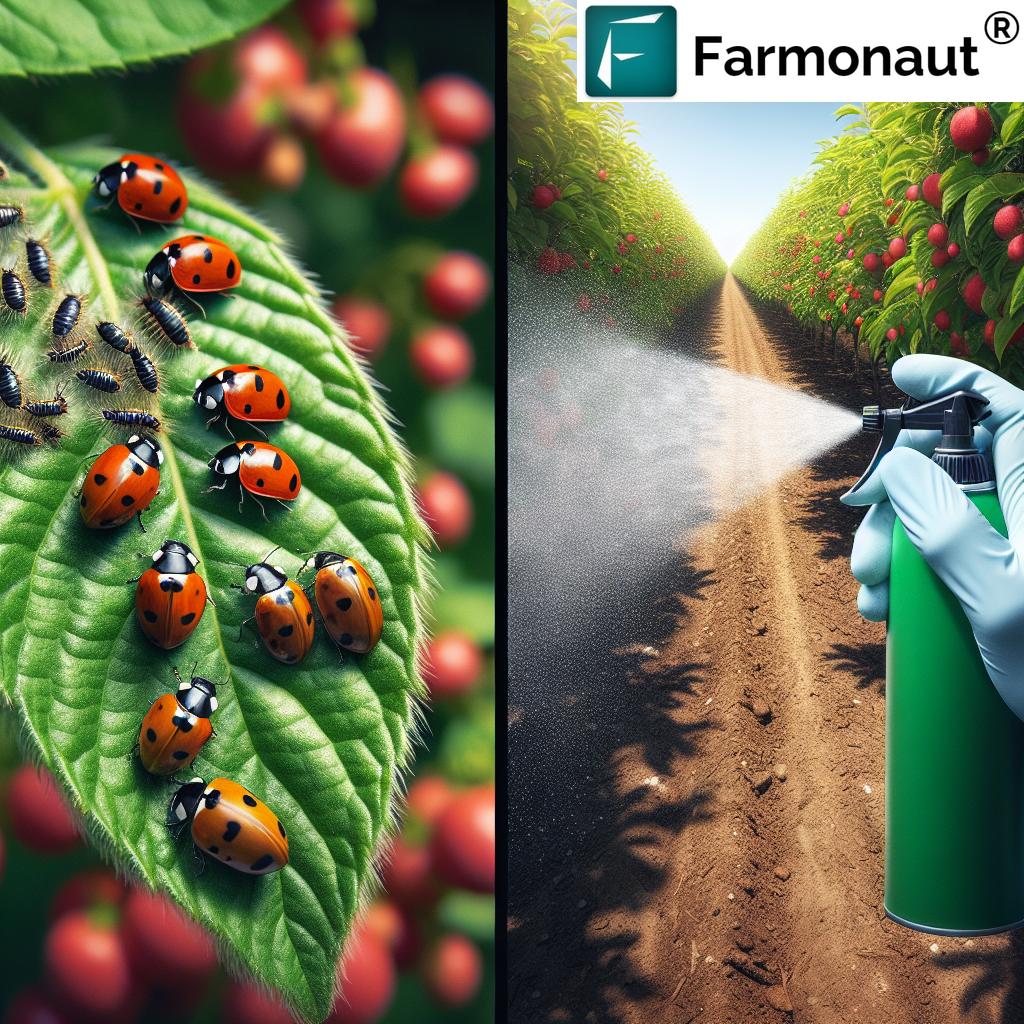
Fruit-Specific Organic Pest Control Strategies
Each Mediterranean fruit has its unique pest challenges. Let’s delve into specific organic pest control strategies for some key fruits:
Citrus Fruits (Orange, Lemon, Mandarin, Grapefruit)
Citrus fruits are a cornerstone of Mediterranean agriculture, but they face several pest challenges:
- Citrus Leafminer Control:
- Use of pheromone traps for monitoring
- Release of parasitic wasps (Ageniaspis citricola)
- Application of neem oil or mineral oil sprays
- Mediterranean Fruit Fly Management:
- Mass trapping using pheromone-baited traps
- Sterile insect technique (SIT) releases
- Bagging of fruits
- Citrus Greening Prevention:
- Regular monitoring and removal of infected trees
- Use of disease-free nursery stock
- Biological control of the Asian citrus psyllid vector
Farmonaut’s satellite monitoring can detect early signs of citrus greening, allowing for prompt intervention.
Stone Fruits (Peach, Nectarine, Apricot, Plum, Cherry)
Stone fruits are susceptible to a range of pests and diseases. Here are some organic control strategies:
- Brown Rot Management:
- Proper pruning to improve air circulation
- Timely removal of infected fruits
- Application of copper-based fungicides (in moderation)
- Peach Twig Borer Control:
- Use of pheromone disruption techniques
- Application of Bacillus thuringiensis (Bt) sprays
- Winter pruning to remove overwintering sites
- Cherry Fruit Fly Prevention:
- Yellow sticky traps for monitoring
- Kaolin clay applications
- Early harvest to avoid peak infestation periods
Our satellite technology can help monitor orchard health, indicating when interventions are needed to prevent disease spread.
Pome Fruits (Apple, Pear)
Apples and pears face unique pest challenges in the Mediterranean climate:
- Codling Moth Management:
- Pheromone disruption
- Granulosis virus applications
- Trunk banding
- Fire Blight Prevention:
- Pruning of infected branches
- Application of copper sprays during dormancy
- Use of resistant rootstocks and varieties
- Apple Scab Control:
- Leaf litter removal in autumn
- Application of lime sulfur during dormancy
- Use of resistant apple varieties
Farmonaut’s technology can help identify areas of the orchard most susceptible to fire blight, allowing for targeted prevention measures.
Grapes
Grape vines, whether for table grapes or wine production, require specific pest management strategies:
- Powdery Mildew Control:
- Canopy management to improve air circulation
- Application of sulfur or potassium bicarbonate sprays
- Use of resistant grape varieties
- Grape Berry Moth Management:
- Pheromone disruption techniques
- Timed releases of Trichogramma wasps
- Application of Bacillus thuringiensis (Bt) sprays
- Birds and Other Vertebrate Pests:
- Netting of grape clusters
- Use of visual deterrents (reflective tape, balloons)
- Sound deterrents (propane cannons, distress calls)
Our satellite monitoring can help assess vineyard vigor and identify areas potentially stressed by pest pressure, allowing for targeted interventions.
Implementing an Integrated Pest Management (IPM) Approach
At Farmonaut, we strongly advocate for an Integrated Pest Management (IPM) approach in Mediterranean fruit orchards. IPM combines various pest control methods to create a comprehensive, environmentally-friendly strategy. Here’s how to implement IPM with the help of our satellite technology:
- Monitoring and Identification:
- Regular orchard scouting
- Use of Farmonaut’s satellite imagery to detect early signs of stress or infestation
- Accurate pest identification through expert consultation or AI-powered image recognition
- Setting Action Thresholds:
- Determine pest population levels that require action
- Use historical data and Farmonaut’s analytics to set appropriate thresholds
- Prevention:
- Implement cultural controls (pruning, sanitation)
- Use resistant varieties when possible
- Maintain orchard biodiversity to support natural enemies
- Control:
- Start with least harmful methods (biological, physical)
- Progress to organic pesticides if necessary
- Use Farmonaut’s precision agriculture tools to optimize treatment timing and application
- Evaluation:
- Assess the effectiveness of control measures
- Use Farmonaut’s historical data analysis to refine strategies over time
By integrating Farmonaut’s satellite monitoring into your IPM strategy, you can achieve more precise, effective, and sustainable pest control in your Mediterranean fruit orchard.
The Role of Technology in Modern Fruit Pest Management
At Farmonaut, we’re at the forefront of integrating advanced technology into agricultural practices. Our satellite-based monitoring system offers several advantages for pest management in Mediterranean fruit orchards:
- Early Detection: Our high-resolution satellite imagery can detect subtle changes in crop health, often indicating pest infestations before they’re visible to the naked eye.
- Precision Treatment: By identifying specific areas of pest pressure, we enable targeted treatments, reducing overall pesticide use.
- Historical Analysis: Our platform allows growers to track pest patterns over time, informing future management strategies.
- Integration with Weather Data: By correlating pest activity with weather patterns, we help predict and prevent future outbreaks.
- Resource Optimization: Our technology helps optimize the use of water, fertilizers, and pesticides, leading to more sustainable and cost-effective orchard management.
To learn more about how Farmonaut can revolutionize your fruit pest management, visit our application page or explore our API documentation.
Challenges and Future Directions in Organic Pest Control for Mediterranean Fruits
While organic pest control methods offer numerous benefits, they also present certain challenges:
- Efficacy Variability: Organic methods can sometimes be less immediately effective than conventional pesticides, requiring patience and consistent application.
- Labor Intensity: Many organic techniques, such as manual removal of pests or frequent monitoring, can be labor-intensive.
- Knowledge Requirements: Successful organic pest management often requires a deep understanding of pest life cycles and ecosystem interactions.
- Climate Change Impact: Changing weather patterns may alter pest behaviors and ranges, requiring adaptive management strategies.
However, the future of organic pest control in Mediterranean fruit orchards looks promising, with ongoing research and technological advancements:
- Improved Biological Control Agents: Development of more effective and targeted beneficial organisms.
- Advanced Pheromone Technologies: More sophisticated mating disruption techniques for key pests.
- Nanotechnology in Pest Control: Nano-formulations of organic pesticides for improved efficacy and reduced environmental impact.
- AI and Machine Learning: Enhanced pest prediction models and automated pest identification systems.
- Gene Editing for Pest Resistance: Development of fruit varieties with enhanced natural pest resistance through CRISPR and other gene-editing technologies.
At Farmonaut, we’re committed to staying at the forefront of these advancements, continually improving our satellite monitoring and data analysis capabilities to support sustainable fruit production in the Mediterranean region.
Conclusion: Embracing Organic Pest Control for Healthier Mediterranean Fruits
As we’ve explored throughout this comprehensive guide, organic pest control methods offer a sustainable, environmentally-friendly approach to protecting Mediterranean fruits. From citrus groves to stone fruit orchards, these techniques not only safeguard the health of the fruits but also preserve the delicate ecosystems that support them.
By embracing an integrated approach that combines biological control, cultural practices, and judicious use of organic treatments, fruit growers can achieve effective pest management while minimizing environmental impact. The integration of advanced technologies, such as Farmonaut’s satellite monitoring system, further enhances the precision and efficacy of these organic methods.
As stewards of the land, it’s our responsibility to balance productive agriculture with environmental conservation. Organic pest control in Mediterranean fruit orchards is not just a trend, but a necessary evolution in our approach to fruit cultivation. It ensures that future generations can continue to enjoy the bounty of Mediterranean fruits while preserving the rich biodiversity of this unique region.
We invite you to join us in this journey towards more sustainable fruit production. Explore how Farmonaut’s technology can support your transition to organic pest control methods by visiting our website or downloading our mobile app:
Together, we can cultivate a future where Mediterranean fruits thrive in harmony with nature, protected by innovative, organic pest control strategies.
FAQs: Organic Pest Control for Mediterranean Fruits
- Q: What are the most common pests affecting Mediterranean fruit trees?
A: Common pests include Mediterranean fruit fly, citrus leafminer, olive fruit fly, peach twig borer, and codling moth. Diseases like citrus greening and brown rot are also significant concerns. - Q: How effective are organic pest control methods compared to conventional pesticides?
A: While organic methods may take longer to show results, they can be highly effective when implemented correctly. They also offer long-term benefits such as preserving beneficial insects and soil health. - Q: Can Farmonaut’s satellite technology really detect pest infestations?
A: Yes, our advanced satellite imagery can detect subtle changes in plant health that often indicate pest pressure, allowing for early intervention. - Q: Are organic pesticides completely safe for the environment?
A: While generally safer than synthetic pesticides, organic treatments should still be used judiciously. They can impact non-target organisms if overused. - Q: How often should I monitor my fruit orchard for pests?
A: Regular monitoring is crucial. We recommend weekly inspections during critical growth stages, supported by continuous satellite monitoring through Farmonaut’s platform. - Q: Can I completely eliminate chemical pesticides in my Mediterranean fruit orchard?
A: While it’s possible to significantly reduce or eliminate chemical pesticides, it requires a comprehensive IPM approach. In some severe cases, limited use of chemical pesticides may be necessary as a last resort. - Q: How does climate change affect pest control in Mediterranean fruit orchards?
A: Climate change can alter pest life cycles, introduce new pest species, and change the effectiveness of certain control methods. Adaptive management strategies and continuous monitoring are essential. - Q: What are the cost implications of switching to organic pest control methods?
A: Initial costs may be higher due to labor and specialized inputs, but long-term costs often decrease as the orchard ecosystem becomes more balanced. Farmonaut’s technology can help optimize resource use, further reducing costs. - Q: How can I encourage beneficial insects in my fruit orchard?
A: Plant diverse flowering species, provide water sources, avoid broad-spectrum pesticides, and maintain areas of natural habitat around the orchard. - Q: Is organic pest control suitable for large-scale commercial fruit production?
A: Yes, with proper planning and implementation, organic pest control can be effective for large-scale operations. Farmonaut’s satellite monitoring is particularly beneficial for managing pest control across large areas.


